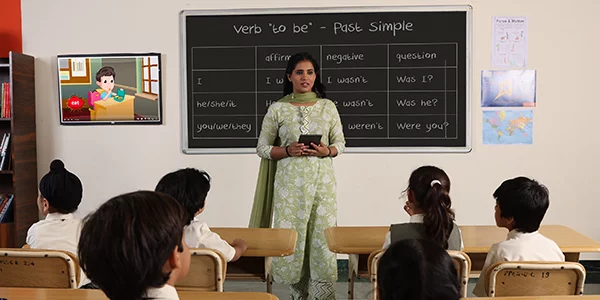Expert Primary Science Tuition Singapore for Understanding Complex Concepts
Expert Primary Science Tuition Singapore for Understanding Complex Concepts
Blog Article
Checking Out the Various Teaching Methods in Primary Science Education Today
Inquiry-based discovering, hands-on experiments, and the assimilation of modern technology are redefining exactly how instructors engage young minds. Furthermore, collective approaches and separated instruction are being employed to provide to the diverse requirements of pupils, improving both interaction and understanding.
Inquiry-Based Knowing
Inquiry-Based Understanding (IBL) is a pedagogical approach that encourages trainees to explore scientific concepts with doubting, examination, and hands-on testing. This method highlights the duty of students as energetic participants in their understanding, promoting important reasoning and analytical abilities. By involving with real-world questions, trainees end up being interested and determined, which boosts their understanding of scientific principles.
In IBL, instructors function as facilitators, leading trainees as they navigate their inquiries instead of providing info directly. This student-centered strategy enables distinction, suiting various discovering designs and rates. Trainees create abilities in creating theories, developing experiments, and assessing information, which are essential for scientific proficiency.
Additionally, IBL fosters collaboration among trainees, motivating them to share ideas and findings. This collective inquiry promotes social skills and a feeling of area within the class. Moreover, the procedure of query motivates resilience, as students find out to welcome failure as a stepping rock toward understanding.
Hands-On Experiments
Hands-on experiments are a crucial component of reliable science education, enhancing the principles of inquiry-based learning. These experiments enable trainees to involve directly with clinical concepts, fostering a much deeper understanding through experiential understanding. By manipulating materials and observing results, young learners can comprehend abstract theories in concrete methods.
Such activities advertise essential reasoning and analytical abilities, as pupils hypothesize results, conduct experiments, and evaluate outcomes. This process urges them to ask questions, fine-tune their understanding, and establish a scientific state of mind. Furthermore, hands-on experiments can be customized to diverse understanding designs, making certain that all trainees have the chance to engage meaningfully with the content.
Moreover, hands-on experiments often encourage cooperation amongst peers, promoting team effort and interaction skills. Functioning in groups allows pupils to share ideas, go over findings, and pick up from each other, which enhances their general academic experience.
Including hands-on experiments into the key scientific research curriculum not only enriches the learning environment however additionally cultivates a lifelong rate of interest in science. By actively getting involved in their education and learning, students are more probable to create an enthusiasm for scientific questions that extends beyond the class.

Technology Integration
Integrating technology right into main science education has actually come to be progressively vital in promoting pupil interaction and boosting finding out end results. Using electronic devices, such as interactive simulations, online laboratories, and instructional software program, gives trainees with opportunities to explore clinical ideas in innovative methods. These sources help with a deeper understanding of intricate subjects by allowing students to envision and control variables that would certainly be not practical in a conventional classroom setup.
Furthermore, modern technology assimilation urges personalized finding out experiences. Students can advance at their own rate, revisiting difficult principles with multimedia resources, which provide to various learning styles. This flexibility not just sustains specific development but additionally grows a feeling of freedom in students.
Furthermore, technology acts as a bridge to real-world science, linking students with existing study and expert payments. Access to on the internet databases and clinical journals widens students' viewpoints on clinical inquiry and cultivates essential thinking abilities.
Collaborative Learning
Collaborative learning plays an essential function in main science education and learning by fostering synergy and interaction skills amongst pupils. This strategy encourages learners to interact, share understanding, and involve in analytical, which enhances their understanding of scientific ideas. By taking part in group tasks, trainees learn to express their ideas, pay attention to varied perspectives, over at this website and work out solutions, every one of which are necessary skills in both real-world and academic contexts.

Study shows that collaborative knowing can lead to boosted motivation and engagement in scientific research subjects, as pupils locate pleasure in common experiences (primary science tuition Singapore). Additionally, this approach prepares pupils for future collective endeavors, outfitting them with the skills needed for reliable team effort in higher education and professional atmospheres. Ultimately, welcoming collaborative discovering in main science education and learning can significantly improve the discovering experience and advertise a deeper understanding of clinical query
Separated Direction

Separated see this site guideline can show up in various methods, such as differing the web content, processes, or items of understanding. Educators might use tiered assignments that supply varying degrees of complexity, allowing students to work at their particular preparedness degrees. In addition, versatile grouping approaches can facilitate cooperation amongst students with different capabilities, promoting peer learning.
Assessment plays an important function in this strategy, as it educates instruction and aids instructors comprehend each student's distinct requirements. Developmental assessments, such as observations and quizzes, can assist teachers in adjusting their approaches to boost discovering end results. primary science tuition Singapore. Ultimately, by carrying out distinguished guideline in main science education and learning, instructors can cultivate a much more fair and efficient learning environment, equipping all students to reach their full potential in comprehending scientific phenomena
Verdict
In summary, the diverse teaching approaches in key scientific research education, including inquiry-based understanding, hands-on experiments, modern technology combination, collaborative understanding, and distinguished guideline, collectively add to an extra reliable learning setting. These methods promote essential reasoning, analytic skills, and a much deeper comprehension of scientific ideas. By executing these strategies, instructors can produce supportive and appealing classrooms that deal with the varied needs of pupils, ultimately fostering a long-lasting rate of interest in scientific research and improving scholastic achievement.
Inquiry-Based Knowing (IBL) is an instructional method that urges students to discover scientific principles through questioning, investigation, and hands-on trial and error.Collaborative understanding plays an essential duty in main science education and learning by cultivating teamwork and interaction abilities amongst trainees.Research shows that collaborative discovering can lead to enhanced inspiration and engagement in scientific research subjects, as pupils locate pleasure in common experiences.In fostering a comprehensive knowing atmosphere, differentiated instruction emerges as a vital method to suit the varied demands and capabilities of pupils in main scientific research education and learning. visit this web-site Inevitably, by applying set apart direction in key science education, instructors can cultivate an extra effective and equitable understanding setting, empowering all trainees to reach their complete potential in recognizing clinical phenomena.
Report this page